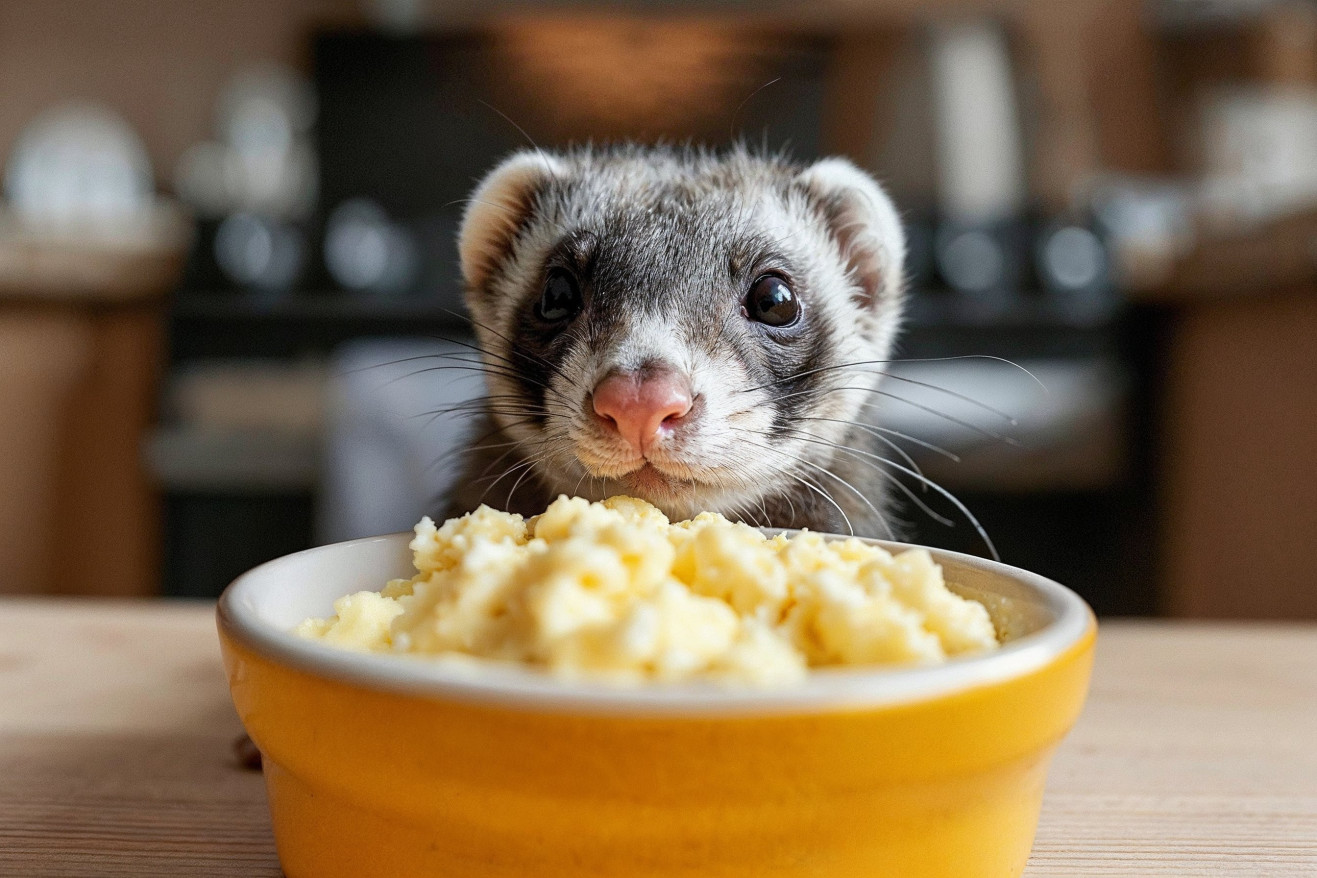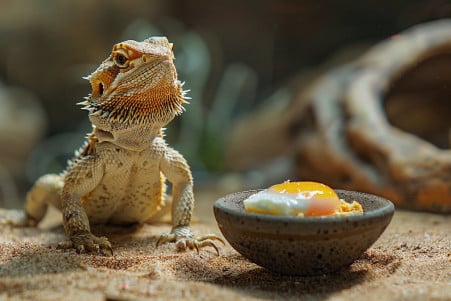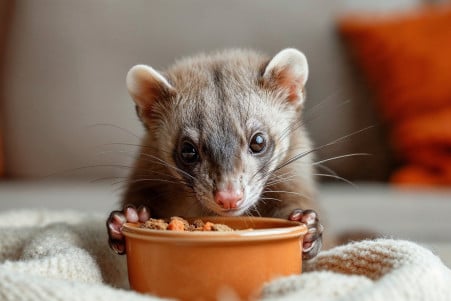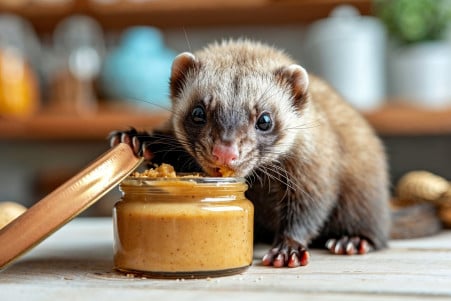Can Ferrets Eat Eggs? Nutritional Guidelines and Benefits
20 January 2024 • Updated 28 January 2024

Are eggs a great source of protein for your ferret, or should you avoid feeding them this food altogether? Ferrets can eat eggs, and since they are obligate carnivores, eggs provide a good source of animal protein. However, it’s important to feed eggs to your ferret in moderation—about one to two eggs per week—to prevent any digestive upset and to make sure your pet is getting a well-rounded diet.
We’ll explore information from veterinarians and nutritional research to give you a complete picture of how eggs fit into a ferret’s diet. Throughout our investigation, we’ll cover how eggs should be prepared, how often they should be fed to ferrets, and the benefits and potential drawbacks of including eggs in a ferret’s diet.
After reviewing this information, you’ll have the knowledge you need to decide whether or not to feed eggs to your ferret in a way that promotes its overall health and well-being.
Can ferrets eat eggs?
Why Ferrets Need a Certain Diet
The dietary requirements of ferrets are a direct result of their evolution as obligate carnivores. According to Dr. Ned Gentz and the Veterinary Partner editorial staff, ferrets need a diet that is high in animal protein and fat and low in carbohydrates and fiber because of their high metabolic rate and an extremely short digestive tract that is designed to absorb nutrients from animal products.
This means that they need to eat small amounts of food often, which is why it’s important to ensure that a balanced diet is available throughout the day.
As the study by J.A. Bell on PubMed explains, eggs can be a great way to supplement a ferret’s diet because they provide nutrients and vitamins that can help balance out the nutrients that they get from their primary food source.
Eggs can be used to meet the high protein needs of growing kits or the high caloric needs of lactating females, and as UK Pet Food points out, they can be fed in a way that fits in with the ferret’s need for small, frequent meals and minimal treats.
That said, it’s important to note that every ferret is different, and you’ll need to work with a vet to develop a diet that meets your pet’s specific needs and health concerns. This way, you can make sure that while eggs can be a healthy part of your ferret’s diet, they are just one part of a diet that meets all of your pet’s nutritional needs.
Eggs Are a Nutritional Powerhouse for Ferrets
As mentioned by Get Cracking, eggs are a rich source of essential amino acids, which means they are a complete protein source that is essential for ferret health. Amino acids are important for the body’s growth, repair, and maintenance.
According to PMC, the vitamins A, D, E, and minerals such as iron and folate found in eggs also make them a valuable part of a ferret’s diet. These vitamins and minerals are important for everything from maintaining healthy eyesight to supporting the immune system.
In addition, the nutritional benefits of eggs have been shown to improve the health of a ferret’s coat and skin. Egg Nutrition explains that the fats found in eggs, which are about two-thirds unsaturated, not only provide energy but also help make a ferret’s coat shiny and smooth. In addition, the fat and protein in eggs can help reduce the risk of hairballs by improving the health of the digestive system.
That said, it’s important to remember that eggs should still be fed to ferrets in moderation. As with under-nutrition, over-nutrition can be harmful, and it’s important to maintain a balanced diet. This means making sure that eggs are being fed in a way that allows ferrets to benefit from their nutrients without experiencing the health problems that can come from overeating.
How to Make the Perfect Egg Snack for Your Ferret
If you’re wondering how to feed eggs to your ferret, it’s best to feed them whole or scrambled to ensure that your pet gets all the nutrients without the risk of biotin deficiency.
This is because the yolk contains biotin, which can counteract the avidin in egg whites that can block biotin absorption.
While cooking eggs can change their nutrient content, it can also help to reduce the risk of Salmonella, which is a concern that was brought up in a thread on The Holistic Ferret Forum.
While ferrets’ short digestive tracts usually protect them from bacteria like Salmonella, cooking the eggs can help to ensure that they’re safe for even the most sensitive pets.
It’s also important to make sure that you don’t overdo it. My Pet Ferret recommends feeding no more than two eggs a week to avoid digestive upset.
By introducing eggs into your ferret’s diet slowly, you can watch for any negative reactions or allergies.
Hard-boiled and scrambled eggs are the most popular ways to prepare eggs for your ferret because they’re easy to eat and less messy. Make sure to serve them in these cooked forms to make sure that your ferret can eat this nutritious snack without any problems, setting them up for a long and healthy life.
Mitigating the Dangers of Feeding Eggs to Ferrets
While eggs can be a healthy addition to a ferret’s diet, especially when fed in moderation, overeating can lead to gastrointestinal problems, such as constipation. This is because ferrets have a high metabolism and a short gastrointestinal tract that can be sensitive to dietary changes.
Another risk is the potential for Salmonella poisoning, which PetMD notes can occur in ferrets, especially in young ferrets with weaker immune systems and those that are fed undercooked meat. However, VCA Animal Hospitals explains that ferrets are less likely to get salmonellosis than other animals, which may be due to their unique digestive systems.
In some cases, ferrets may be allergic to eggs. It’s important to introduce eggs into a ferret’s diet slowly and watch for any signs of an allergic reaction. In addition, it’s not recommended to feed ferrets egg whites alone because it can lead to a biotin deficiency, which can be avoided by feeding them the yolk as well.
The Merck Veterinary Manual advises that proper egg handling and storage can help reduce the risks of feeding eggs to ferrets. This includes making sure that eggs are fresh and stored at the correct temperature and even considering cooking them to kill any bacteria, all of which can help ensure that your ferret can safely enjoy this protein-packed snack.
Egg Nutritional Requirements for Ferrets
When fed properly, eggs can be a valuable addition to the complex nutritional needs of ferrets. We’ve gone through the research and can say with confidence that eggs are good for your ferret, providing high-quality protein and essential nutrients. The amino acids, vitamins, and minerals in eggs meet your pet’s carnivorous requirements and contribute to their overall health, from ensuring a shiny coat to supporting healthy development.
That said, it’s important to remember that everything should be done in moderation. To avoid issues like digestive problems or nutrient deficiencies, eggs should be portioned correctly and introduced slowly. Cooking eggs can help reduce the risk of bacterial contamination, and hard-boiled and scrambled eggs are the best and safest options.
It’s important to work with a vet to get personalized recommendations that take into account your ferret’s individual needs. As we wrap up, it’s important to remember that the balance between nutrition and fun is at the heart of feeding your ferret eggs—a balance that can lead to both health and happiness.


